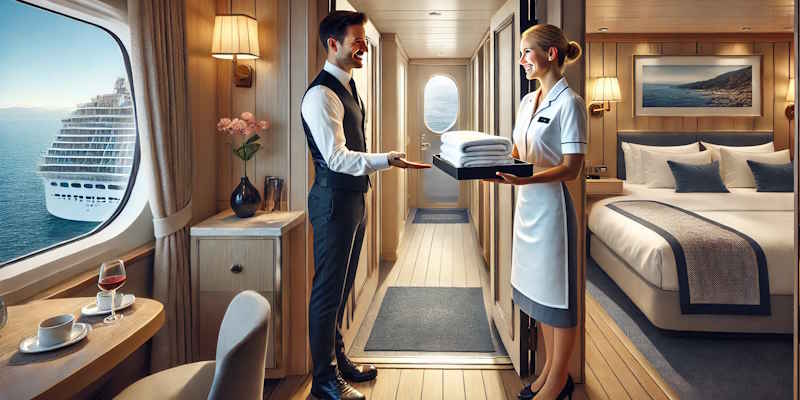Imagine booking your dream cruise, eagerly anticipating sun-soaked days cruising the Caribbean or Mediterranean. You’re just about to click “confirm” when you’re asked— “Would you like to pay gratuities now?” Wait, what? Why are you being asked to tip before stepping on board? And what happens if you decide not to pay these gratuities upfront?
Welcome to the murky waters of cruise gratuities. Tipping on cruise ships leaves many passengers in a dilemma. Prepaying gratuities can add a few hundred dollars to the bill. However, you don’t know what kind of service you’ll get. And what about staff who go above and beyond the call of duty? You may feel hesitant about tipping because you’ve already paid gratuities.
In this article, I’ll explore the controversial world of cruise gratuities. I’ve spent countless hours combing through cruise forums, discussion pages, and blogs from experienced travelers. The insights I’ve gathered have opened my eyes to the truth about what happens to gratuities on cruise ships.
Whether you’re a first-time cruiser or a seasoned traveler, understanding how cruise gratuities work can help you keep your budget on track and ensure you receive the top-notch service you deserve.
Why Gratuities are Controversial
Paying gratuities is one of the most hotly debated topics in the cruising world. Cruise forums are filled with diverse opinions—some passengers believe tipping should be a voluntary reward for outstanding service, while others argue that crew members rely on these tips for their income. Meanwhile, some refuse to tip at all, insisting that wealthy cruise companies should pay their staff fair wages. This ongoing debate highlights the complexities surrounding gratuities, reflecting broader concerns about fairness and responsibility in the cruise industry.
Gratuities From the Staff Perspective

For cruise staff, gratuities are more than just a bonus—they’re a crucial part of their income. Many crew members work in service roles like housekeeping and dining and depend on tips to supplement their low wages. Cruise lines say that evenly distributing gratuities is a fairer system for staff who work behind the scenes with little contact with passengers.
Interestingly, I discovered that not all crew members may be included in the gratuity scheme. Additionally, many cruise guests raise ethical questions about cruise lines using tips to subsidize low wages. Many cruise ships are not registered in the U.S. because cruise companies can avoid more stringent labor laws.
Also, cruise passengers discuss whether a crew member who works exceedingly hard should get the same amount in tips as someone who slacks off. So, the challenge is to strike a balance between the crew, whose livelihood depends on tips, and passengers, who want fair allocation.
Where do your gratuities go?
According to cruise lines, the following crew members are typically included:
- Dining and bar staff
- Culinary services staff
- Stateroom attendants
- Guest services team
Additionally, the blurb on cruise line websites says that “others onboard who work to enhance the overall cruise experience” also receive a share of the gratuities. Does that include the captain and bridge staff? I don’t know.
Gratuities From the Passenger Perspective

Passengers have mixed feelings about prepaid gratuities and tipping individual crew members. Research shows that most Americans think each staff member should keep 100 percent of the money they receive in tips. Also, many international travelers don’t come from countries with tipping cultures. They prefer to tip crew members who excel in service or personal attention directly.
Here’s a list of the biggest gripes passengers have about cruise gratuities:
- Lack of transparency on how tips are distributed among staff.
- Automatic gratuities make travelers feel pressured to pay tipping charges.
- Prepaying gratuities creates unease before service is provided.
- Lack of fairness means tips may not reach the intended crew members.
- Service quality should determine the amount of tips based on the level of service received.
- Cultural differences make tipping confusing for non-U.S. cruisers.
I read a story from a seasoned cruiser from the U.K. who was frustrated about paying an extra $200 to $300 in gratuities before packing a suitcase. To him, it felt like an unnecessary “cruise line tax.” He believed these fees didn’t improve service quality but supplemented the crew’s wages.
On the other hand, many cruise passengers love the simplicity of prepaying gratuities. They can relax and enjoy their vacation without worrying about gratuity charges piling up. It simplifies budgeting by taking care of additional expenses before boarding, eliminating nasty financial surprises at the end.
How Much Do Cruise Line Gratuities Cost?
Cruise line gratuities typically range between $14 and $18 per person daily. However, some cheaper cruise lines charge under $10 for basic cabins and over $25 for luxury staterooms. Therefore, you should expect to pay $100 to $130 per person for a seven-day cruise.
Some luxury cruise lines may include gratuities in the fare. Therefore, you have no extra charges onboard.
Gratuities: Should You Prepay, Pay On Board, or Tip as You Go?

Putting the controversy of cruise gratuities aside, all passengers must decide on their tipping strategy. Your three options are to prepay, pay on board, or remove all automatic gratuities and tip as you go. Which is the best option for you? There is no definitive answer. From my extensive online research, I’ve found various opinions on what works best for different passengers.
Understanding each choice can help you make the most informed decision for your cruise experience. Here are some recommendations.
Prepaying gratuities
Prepaying gratuities is becoming increasingly popular among cruisers. When you prepay, the gratuity charges are automatically added to your cruise fare before departure. You can pay up to the embarkation date.
Here are some advantages and disadvantages of this method:
Advantages:
- Budget-friendly: Prepaying allows you to manage your travel budget better by knowing how much you’ll spend on gratuities up front.
- Reduce stress: With gratuities taken care of, you can focus on enjoying your vacation rather than worrying about tips each day.
- Consistency: The amount remains the same regardless of the level of service, which provides peace of mind if the gratuity level increases before the sail date.
Disadvantages:
- Lack of personal touch: It may feel less personal, as tips are not directly tied to the level of service you receive.
- Potential overpayment: If you encounter less-than-stellar service, you might feel frustrated at having paid a set gratuity. However, you can request a refund at Guest Services.
Paying gratuities onboard
The total amount of gratuities will appear on your bill. It will be itemized for each day so you can keep track of the payments. However, most cruisers agree that this is the least preferred method. This is because paying gratuities at the end of the cruise can result in a large, unexpected bill, which might feel overwhelming. Additionally, handling gratuities at the end rather than prepaying means you lose the convenience of having all expenses settled upfront, and you could also accidentally double tip for extra services during the cruise.
Tip as you go
Some cruise forums recommend removing automatic gratuities from the bill and paying cash tips to staff. I’ve noticed that cruisers from Australia and the U.K. sometimes use this option as they’re not accustomed to mandatory tipping.
However, there are anecdotal reports suggesting that passengers who remove gratuities might receive poorer service. Some believe that ships keep a list of passengers who prepay gratuities versus those who don’t. Yet, it’s important to remember that service quality can vary, and some staff may provide inconsistent service regardless of tipping.
Remember that cruise line gratuities go into a large pot and are shared among staff. Therefore, if you decide to tip only a few crew members directly, you may inadvertently exclude others who also contributed to your overall experience.
How to Remove Automatic Gratuities

It’s vital to remember that gratuities are always optional, even though cruise lines make them appear mandatory. I’m not advocating one way or another, as I believe that tipping has its place onboard. However, if you want to remove automatic gratuities, this is what you should do:
- Visit the guest services desk
- Request that gratuities be removed from your account
- Be prepared to give a reason (the cruise line may want to know if it’s due to sub-par service)
The main reasons not to prepay gratuities
From researching the controversies surrounding cruise gratuities, I’ve realized they are a fact of life on a cruise ship. Like them or not, they help to pay the crew a fair wage. However, some passengers choose not to prepay gratuities because they prefer to evaluate the quality of service before deciding on the amount to tip. This approach allows for a more personalized tipping experience, reflecting the service received during the cruise.
Personal Tipping Strategies

As a regular cruiser, I’ve learned that mandatory gratuities are just part of the deal—meant to help the crew. But you don’t want to tip twice or overpay for services already covered.
Here are my go-to tipping strategies, plus some great tips I picked up from other cruisers online to keep things fair and simple.
Pre-tip key staff: I always give a small tip to my room steward at the beginning of the cruise to ensure excellent service throughout the trip.
Tip for exceptional service: Most cruise guests recommend tipping extra for outstanding service, such as remembering drink preferences or providing personalized attention.
Carry cash for extra tips: If you plan on making small cash tips, I recommend keeping small bills handy for tipping service staff directly.
Tip porters separately: Always tip porters at the terminal, as they are not included in prepaid gratuities.
Evaluate service levels: Adjust your tipping strategy based on the quality of service you receive. Remember, for poor service, request that the gratuity be removed. However, for exceptional service, consider giving an extra tip.
Tip for special requests: If you have specific needs or make special requests, offer a tip to show appreciation for the extra effort.
Use discretionary tipping: For non-service roles like entertainers or fitness instructors, consider discretionary tipping if they greatly enhance your cruise experience.
Check for service charges: I always check if service charges are included in specialty dining venues. I never leave an additional tip if it’s included (and it usually is).
Choosing the Right Cruise Line

Cruise lines have different policies on how they manage gratuities. Most cruise lines originating from U.S. ports have options for prepaid or pay-onboard gratuities at a daily rate. Other luxury, Expedition, and U.K. cruise lines include gratuities in the fare. But what’s the difference?
When gratuities are included in the fare, you cannot opt out of them. However, you don’t have to tip staff separately on board. Cruise lines like Silversea, Regent Seven Seas, P&O Cruises, and Virgin Voyages have gratuity-included fares.
One cruiser wrote that he and his wife always cruise with Viking for river and sea voyages, and there are no gratuities to pay unless you want something specific. Other cruise passengers who travel with luxury lines or expedition cruises love the simplicity of tips included in the cruise fare.
The Risks of Removing Gratuities
What do you risk by removing automatic gratuities from your cruise bill? Is there a danger of getting poorer service on a cruise ship? According to experienced travelers, this is not the case. I generally find that staff are keen to help and do their job efficiently, while customer service usually quickly resolves any issues.
I read a comment on a cruise forum about a couple who had excellent service during the first couple of nights. Then, service deteriorated from the third night, and the staff became rude. They said the staff must have heard they’d removed the automatic gratuities.

However, I find that hard to believe. And their experience doesn’t mirror what I’ve mostly read on forums about removing tips from the bill.
Here’s what I’ve learned about removing gratuities from the bills:
- Removing tips doesn’t typically result in worse service.
- Gratuities contribute significantly to crew income and can negatively impact crew wages.
- Managing your own tips can be more stressful than paying upfront.
Cruise Line Manipulations
Most controversy surrounding cruise line gratuities is connected to psychological tactics they use to get you to pay. For example, I encountered common complaints like: “Gratuities are simply a way of making the cruise fare look cheaper than bumping the price up later.” “Automatic gratuities are a form of cruise line tax on passengers.”
Some ways cruise lines use manipulation to “force” us to pay gratuities can include the following:
- Stress-Free Experience: Prepaying gratuities is framed as a way to avoid end-of-cruise stress by ensuring that tipping is handled upfront, simplifying the experience for passengers.
- Inclusion in Booking Process: Gratuities are often included during booking, making it seem like an essential part of the package, which can pressure passengers into paying upfront.
- Rewarding Staff: Cruise lines present gratuities as a way to reward hardworking staff, subtly encouraging passengers to feel obligated to contribute.
- Lack of Transparency: Cruise lines are often unclear about the process for removing automatic gratuities.
- In-Person Removal Only: The only way to remove gratuities is by visiting the guest services in person, adding extra inconvenience.
Remember, the real reason for “optional” gratuities is that they avoid U.S. or European labor regulations so they can pay backroom staff the lowest wages possible.
Advice from Experienced Cruisers

Chatting with some experienced cruisers opened my eyes to the dark world of tipping on cruise ships. They prefer to remove all automatic gratuities from the bill and generously tip waiters, bar staff, and housekeepers. However, even seasoned cruisers disagree with this strategy because it ignores the staff you never see.
Some high-end cruise lines, like Viking and Silversea, pay their staff well and include gratuities in the cruise cost. I’ve found that this approach creates a more relaxed and genuine service environment. I’ve also found that the quality of service on cruise lines that include gratuities in the fare is generally better because the staff is well paid.
So, my advice is to carefully consider your approach to gratuities based on the cruise line and your personal comfort level with tipping practices.
Why Some Cruisers Choose to Pay Gratuities
Most cruise passengers accept automatic gratuities as part of the cruise fare. They either prepay the extra fees or pay at the end of the cruise, realizing that crew members depend on the tips for their pay, as their base salary is quite low.
Of course, the fact that rich cruise companies want the public to subsidize wages will constantly fuel the debate.
Conclusion: The Great Gratuity Debate

Researching the complexities of cruise gratuities was an eye-opener for me. Paying gratuities is part of the cruise culture, and—love it or hate it—the crew depends on tips for their wages. So, it comes down to how you want to tip staff who work hard to make cruise experiences memorable for everyone.
Making an informed decision about gratuities can significantly enhance your cruise experience. It ensures you stay within budget while rewarding the staff who make your trip memorable.
What are your experiences tipping cruise members? I’d love to hear your comments below to keep the discussion going on this hotly debated topic.
Related articles:

